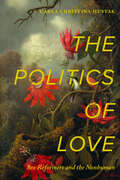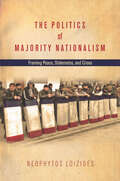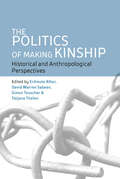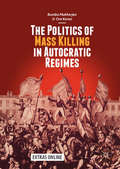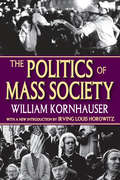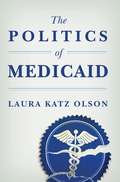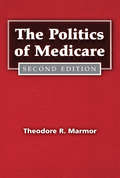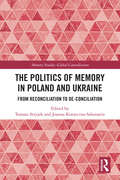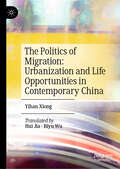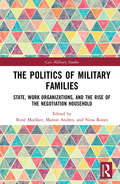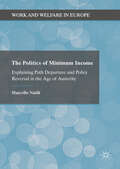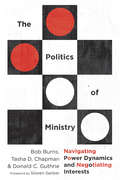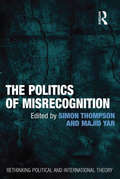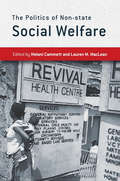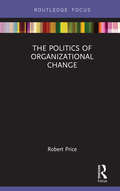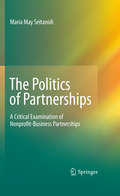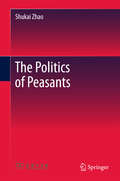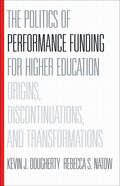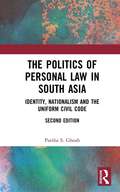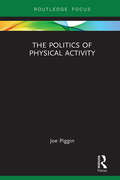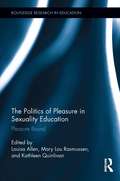- Table View
- List View
The Politics of Love: Sex Reformers and the Nonhuman
by Carla Christina HustakThe Politics of Love explores the entanglement of emotions, social movements, and science in reconfiguring human and nonhuman relations. As Darwin's evolutionary theory informed the development of sexual science and the sex reform movement between the 1890s and the 1920s, sex reformers emerged as a group of diverse and culturally influential professionals—doctors, psychologists, artists, political activists, novelists, and academics—who shared a profound commitment to changing the world by changing the practice of sex. Sex reformers reinvented love as a scientific practice of sex that brought humans and nonhumans into the fold of early-twentieth-century racial, gender, and sexual politics. Carla Christina Hustak illuminates how sex reformers' insistence that love can shift human and nonhuman relations is more than just a historical narrative—it is a moment in time interconnected with urgent contemporary concerns over the global implications of our emotional relationships to other humans, animals, the earth, and atmospheric and technological forces.
The Politics of Majority Nationalism: Framing Peace, Stalemates, and Crises
by Neophytos LoizidesWhat drives the politics of majority nationalism during crises, stalemates and peace mediations? In his innovative study of majority nationalism, Neophytos Loizides answers this important question by investigating how peacemakers succeed or fail in transforming the language of ethnic nationalism and war. The Politics of Majority Nationalism focuses on the contemporary politics of the 'post-Ottoman neighborhood' to explore conflict management in Greece and Turkey while extending its arguments to Serbia, Georgia and Ukraine. Drawing on systematic coding of parliamentary debates, new datasets and elite interviews, the book analyses and explains the under-emphasized linkages between institutions, symbols, and framing processes that enable or restrict the choice of peace. Emphasizing the constraints societies face when trapped in antagonistic frames, Loizides argues wisely mediated institutional arrangements can allow peacemaking to progress.
The Politics of Making Kinship: Historical and Anthropological Perspectives
by Tatjana Thelen Erdmute Alber, David Warren Sabean, Simon TeuscherThe long tradition of Western political thought included kinship in models of public order, but the social sciences excised it from theories of the state, public sphere, and democratic order. Kinship has, however, neither completely disappeared from the political cultures of the West nor played the determining social and political role ascribed to it elsewhere. Exploring the issues that arise once the divide between kinship and politics is no longer taken for granted, The Politics of Making Kinship demonstrates how political processes have shaped concepts of kinship over time and, conversely, how political projects have been shaped by specific understandings, idioms and uses of kinship. Taking vantage points from the post-Roman era to early modernity, and from colonial imperialism to the fall of the Berlin Wall and beyond this international set of scholars place kinship centerstage and reintegrate it with political theory.
The Politics of Mass Killing in Autocratic Regimes
by Bumba Mukherjee Ore KorenThis book develops a detailed, disaggregated theoretical and empirical framework that explains variations in mass killing by authoritarian regimes globally, with a specific focus on Pakistan, Indonesia, and Malaysia. Using a combination of game-theoretic, statistical, and qualitative approaches, this project explicates when civilians within nondemocratic states will mobilize against the ruling elite, and when such mobilization will result in mass killing. In doing so, it illustrates the important role urbanization and food insecurity historically played, and will continue to play, in generating extreme forms of civilian victimization.
The Politics of Mass Society
by William KornhauserThe Politics of Mass Society explores the social conditions necessary for democracy and the vulnerabilities of large scale society to totalitarian systems. Mass movements mobilize people who are alienated from the social system, who do not believe in the legitimacy of the established order, and who are therefore ready to engage in efforts to destroy. Contrary to the psychological approach prevalent in European doctrines of mass movements, Kornhauser persuasively argues that social order is the critical factor. The greatest number of people available to mass movements are located in those segments of society that have the fewest ties to social order. The book draws on a wide range of materials--from classical political theory contemporary sociological analysis, historical and intuitional studies, public opinion surveys, and other published and unpublished data. Kornhauser selected political phenomena in organizations, communities, classes, and whole societies. He examined support for communism and fascism in a variety of countries in relation to rates of urbanization and industrialization, employment, and suicide and homicide among other phenomena. In his new introduction, Irving Louis Horowitz identifies Kornhauser's book as a seminal work of the great tradition in political sociology in the mid-twentieth century. Kornhauser points out that modern democratic systems possess a distinct vulnerability to mass movements. He spells out and identifies factors that tend to increase or decrease this vulnerability--not least the health and strength of elites. In this way, the book reveals new clues to the origins and nature of mass political movements. The Politics of Mass Society remains the most complete analytical account of the sociological approach to mass society in advanced industrial societies.
The Politics of Medicaid
by Laura Katz OlsonIn 1965, the United States government enacted legislation to provide low-income individuals with quality health care and related services. Initially viewed as the friendless stepchild of Medicare, Medicaid has grown exponentially since its inception, becoming a formidable force of its own. Funded jointly by the national government and each of the fifty states, the program is now the fourth most expensive item in the federal budget and the second largest category of spending for almost every state. Now, under the new, historic health care reform legislation, Medicaid is scheduled to include sixteen million more people.Laura Katz Olson, an expert on health, aging, and long-term care policy, unravels the multifaceted and perplexing puzzle of Medicaid with respect to those who invest in and benefit from the program. Assessing the social, political, and economic dynamics that have shaped Medicaid for almost half a century, she helps readers of all backgrounds understand the entrenched and powerful interests woven into the system that have been instrumental in swelling costs and holding elected officials hostage. Addressing such fundamental questions as whether patients receive good care and whether Medicaid meets the needs of the low-income population it is supposed to serve, Olson evaluates the extent to which the program is an appropriate foundation for health care reform.
The Politics of Medicare (Social Institutions And Social Change Ser.)
by Theodore R. MarmorOn July 30, 1965, President Johnson flew to Independence, Missouri to sign the Medicare bill. The new statute included two related insurance programs to finance substantial portions of the hospital and physician expenses incurred by Americans over the age of sixty-five. Public attempts to improve American health standards have typically precipitated bitter debate, even as the issue has shifted from the professional and legal status of physicians to the availability of hospital care and public health programs. In The Politics of Medicare, Marmor helps the reader understand Medicare's origins, and he interprets the history of the program and explores what happened to Medicare politically as it turned from a legislative act in the mid-1960s to a major program of American government in the three decades since. This is a vibrant study of an important piece of legislation that asks and answers several questions: How could the American political system yield a policy that simultaneously appeased anti-governmental biases and used the federal government to provide a major entitlement? How was the American Medical Association legally overcome yet placated enough to participate in the program? And how did the Medicare law emerge so enlarged from earlier proposals that themselves had caused so much controversy?
The Politics of Memory in Poland and Ukraine: From Reconciliation to De-Conciliation (Memory Studies: Global Constellations)
by Joanna Konieczna-Sałamatin Tomasz Stryjek Volodymyr SklokinBringing together the work of sociologists, historians, and political scientists, this book explores the increasing importance of the politics of memory in central and eastern European states since the end of communism, with a particular focus on relations between Ukraine and Poland. Through studies of the representation of the past and the creation of memory in education, mass media, and on a local level, it examines the responses of Polish and Ukrainian authorities and public institutions to questions surrounding historical issues between the two nations. At a time of growing renationalization in domestic politics in the region, brought about by challenges connected with migration and fear of Russian military activity, this volume asks whether international cooperation and the stability of democracy are under threat. An exploration of the changes in national historical culture, The Politics of Memory in Poland and Ukraine will appeal to scholars with interests in memory studies, national identity, and the implications of memory-making for contemporary relations between states.
The Politics of Migration: Urbanization and Life Opportunities in Contemporary China
by Yihan XiongBased on extensive fieldwork and longitudinal studies, this book posits that the household registration (hukou) system is a fundamental institutional arrangement in contemporary China. It employs the theoretical framework of local citizenship to analyze the rights and conditions of the migrant population amidst urbanization. Local citizenship functions as both a governance classification and a qualification for access to public resources, influencing not only migration patterns but also the social mobility of various migrant classes. Importantly, the widely discussed education policies for migrant children are part of a broader framework of national migrant management and local industrial policies.
The Politics of Military Families: State, Work Organizations, and the Rise of the Negotiation Household (Cass Military Studies)
by Manon Andres René Moelker Nina RonesThis book examines the politics of military families in relation to the tensions between the state, military organization, and private life. It elaborates on the tensions between the advent of challenging worldwide deployment for the military and the prominence of the home front. The volume aims to understand the dynamics of conflict and change within triad figurations at the macro (society), meso (organizational), and micro (family) level and is guided by the following overarching research questions: What are the key issues in the three-party dynamics? What tensions exist in these dynamics? How do actors seek to arrive at a balance? What initiatives for change are made? With contributions from international scholars, who examine the workings of politics in military families at all three levels, the book argues that members within military families deal with shifting power balances and these are impacted by demands from organizations and the state. This book will be of much interest to students of military studies, sociology, organizational studies and politics.
The Politics of Minimum Income: Explaining Path Departure And Policy Reversal In The Age Of Austerity (Work And Welfare In Europe Ser.)
by Marcello NatiliMinimum income schemes (MIS) have become key social protection institutions for European citizens, but we know little regarding the logic and dynamics of institutional change in this policy field. This book provides an analytical model that will facilitate an understanding of the scope and direction of recent reforms, offering insight into the conditions under which minimum income schemes are introduced, expanded or retrenched. Natili presents a comparative analysis of policy trajectories of minimum income schemes in Italy and Spain between the mid-1980s and 2015. Although these two countries had similar points of departure, and faced comparable functional pressures and institutional constraints, they experienced remarkably different developments in this policy field in the last two decades. This comparative analysis provides empirical evidence of the impacts of different types of credit-claiming dynamics resulting from the interaction of socio-political demand with political supply. The Politics of Minimum Income also assesses the reform processes both in countries that have introduced MIS in the age of austerity (such as Portugal) and in countries that have retrenched them (Austria and Denmark).
The Politics of Ministry: Navigating Power Dynamics and Negotiating Interests
by Steven Garber Bob Burns Tasha D. Chapman Donald C. GuthrieWe all need help navigating the politics of ministry. "Politics" is often considered a dirty word. It brings to mind lies and manipulation, accusations and scandals. But at its most basic level, politics is simply the everyday activity of getting things done with other people: understanding their interests, recognizing the power dynamics at play, and learning how to negotiate relationships and institutions to achieve a common goal. These realities are as true in ministry settings as anywhere else. In The Politics of Ministry, Bob Burns, Tasha Chapman, and Donald Guthrie combine their long ministry experience with sociological research on the topic. Filled with real-life stories taken from a variety of ministry settings, this book sets out wise principles and practices that help us see more clearly the political dynamics at play in our churches and parachurch ministries. All ministry is political. As servants of Christ's kingdom, we are called to navigate the politics of ministry with grace, wisdom, and charity. This book shows us how the gospel of Jesus changes the way we work with those around us toward our common goal.
The Politics of Misrecognition (Rethinking Political and International Theory)
by Majid YarThe past several decades have seen the emergence of a vigorous ongoing debate about the 'politics of recognition'. The initial impetus was provided by the reflections of Charles Taylor and others about the rights to cultural recognition of historically marginalized groups in Western societies. Since then, the parameters of the debate have considerably broadened. However, while debates about the politics of recognition have yielded significant theoretical insights into recognition, its logical and necessary counterpart, misrecognition, has been relatively neglected. 'The Politics of Misrecognition' is the most meticulous reflection to date on the importance of misrecognition for the understandings of our political and personal experience. A team of leading experts from a range of disciplines, including philosophy, political theory, sociology, psychoanalysis, history, moral economy and criminology present different theoretical frameworks in which the politics of misrecognition may be understood. They apply these frameworks to a wide variety of contexts, including those of class identity, disability, slavery, criminal victimization and domestic abuse. In this way, the book provides an essential resource for anyone interested in the dynamics of misrecognition and their implications for the development of political and social theory.
The Politics of Museums (New Directions in Cultural Policy Research)
by Clive GrayThis is the first book to examine how and why museums are political institutions. By concentrating on the ways in which power, ideology and legitimacy work at the international, national and local levels of the museum experience, Clive Gray provides an original analysis of who exercises power and how power is used in museums.
The Politics of Non-state Welfare
by Lauren M. Maclean Melani CammettAcross the world, welfare states are under challenge (or were never developed extensively in the first place) while non-state actors increasingly provide public goods and basic welfare. In many parts of the Middle East and South Asia, sectarian organizations and political parties supply basic services to ordinary people more extensively and effectively than governments. In sub-Saharan Africa, families struggle to pay hospital fees, and nongovernmental organizations (NGOs) launch welfare programs as states cut subsidies and social programs. Likewise, in parts of Latin America, international and domestic NGOs and, increasingly, private firms are key suppliers of social welfare in both urban and rural communities. Even in the United States, where the welfare state is far more developed, secular NGOs and faith-based organizations are critical components of social safety nets. Despite official entitlements to public welfare, citizens in Russia face increasing out-of-pocket expenses as they are effectively compelled to seek social services through the private market.In The Politics of Non-state Social Welfare, a multidisciplinary group of contributors use survey data analysis, spatial analysis, in-depth interviews, and ethnographic and archival research to explore the fundamental transformation of the relationship between states and citizens. The book highlights the political consequences of the non-state provision of social welfare, including the ramifications for equitable and sustainable access to social services, accountability for citizens, and state capacity. The authors do not assume that non-state providers will surpass the performance of weak, inefficient, or sometimes corrupt states but instead offer a systematic analysis of a wide spectrum of non-state actors in a variety of contexts around the world, including sectarian political parties, faith-based organizations, community-based organizations, family networks, informal brokers, and private firms.Contributors: Scott Allard, University of Chicago; Jennifer N. Brass, Indiana University; Melani Cammett, Brown University; Linda Cook, Brown University; Ian Gough, London School of Economics; Michael Jennings, School of Oriental and African Studies; Anirudh Krishna, Duke University; Pauline Jones Luong, University of Michigan; Lauren M. MacLean, Indiana University; Alejandra Mizala, University of Chile; Alison Post, University of California, Berkeley; Ben Ross Schneider, Massachusetts Institute of Technology.
The Politics of Organizational Change (Routledge Focus on Business and Management)
by Robert PricePolitics is an aspect of everyday life within organizations, and is a force that inhibits individual and collective behaviour. If not fully understood, it can impede organizational change and development. In order to minimise the political aspects of organizational dynamics there is a need to understand the extent to which organizational culture brings about politicised conformance and how individuals shape their behaviour through self-interest to conform—sense-giving and sense-making nexus—thus moderating the degree of change initiatives. The Politics of Organizational Change explores the relationship between self-interest, power, politics and managing organizational change from a theoretical perspective. It encourages the fundamental questioning of the relationship between self-interest, power and control inherent within organizational change, and discusses the attendant implications for managing change. It will be of value to those who require a text that goes beyond set patterns of coverage found in textbooks dealing with managing change.
The Politics of Palm Oil Harm
by Hanneke MolThis book examines the politics of harm in the context of palm oil production in Colombia, with a primary focus on the Pacific coast region. Globally, the palm oil industry is associated with practices that fit the most conventional definitions and perceptions of crime, but also crucially, forms of social and environmental harm that do not fit strictly legalistic definitions and understandings of crime. Drawing on rich field-based data from the region, Mol contributes empirically to an awareness of the constructions, practices, and the lived and perceived realities of harm related to palm oil production. She advances criminological debate around 'harm' by putting forward a theoretical and analytical approach that redirects the debate from a central concern with the academic contestedness of harm within criminology, towards a focus on the 'on-the-ground' contestedness of palm oil-related harm in Colombia. Detailed analysis and arresting conclusions ensure this book will be of great interest to students and scholars in the fields of Green and Critical Criminology, Environmental Sociology, and International and Critical Development Studies.
The Politics of Partnerships: A Critical Examination of Nonprofit-Business Partnerships
by Maria May SeitanidiThe widespread partnering phenomenon in the US and the UK spurred a significant amount of literature focusing on its strategic use. The Politics of Partnerships diverges by examining if partnerships can deliver benefits that extend beyond the organisational to the societal level resulting from the intentional combined efforts of the partners.
The Politics of Peasants
by Shukai ZhaoThis book is an analysis and exploration of the relationship between peasants and policies within the process of reform in China. After examining the long term rural policies, either before or after the reform, it was found that all these polices have been expected to promote peasants' interests and claimed to take enhancing peasants' happiness as their goal. Nonetheless, the history and current reality of rural development have demonstrated that the same policy starting point had lead to very different policy designs. Even today, quite a few institutional arrangements with good intentions have ended up with opposite results and have even become bad policies that do harm to people. This book argues that the reason for such serious deviation, between political intentions and institutional arrangements, as well as between policy goals and its results is: as a political force, the peasantry itself has not effectively engaged with the political process of the country.
The Politics of Performance Funding for Higher Education: Origins, Discontinuations, and Transformations
by Kevin J. Dougherty Rebecca S. NatowThe first nation-wide analysis of the politics of performance funding in higher education.Performance funding ties state support of colleges and universities directly to institutional performance on specific outcomes, including retention, number of credits accrued, graduation, and job placement. The theory is that introducing market-like forces will prod institutions to become more efficient and effective. In The Politics of Performance Funding for Higher Education, Kevin J. Dougherty and Rebecca S. Natow explore the sometimes puzzling evolution of this mode of funding higher education. Drawing on an eight-state study of performance funding in Florida, Illinois, Indiana, Missouri, Ohio, South Carolina, Tennessee, and Washington, Dougherty and Natow shed light on the social and political factors affecting the origins, evolution, and demise of these programs. Their findings uncover patterns of frequent adoption, discontinuation, and re-adoption.Of the thirty-six states that have ever adopted performance funding, two-thirds discontinued it, although many of those later re-adopted it. Even when performance funding programs persist over time, they can undergo considerable changes in both the amount of state funding and in the indicators used to allocate funding. Yet performance funding continues to attract interest from federal and state officials, state policy associations, and major foundations as a way of improving educational outcomes.The authors explore the various forces, actors, and motives behind the adoption, discontinuation, and transformation of performance funding programs. They compare U.S. programs to international models, and they gauge the likely future of performance funding, given the volatility of the political forces driving it. Aimed at educators, sociologists, political scientists, and policy makers, this book will be hailed as the definitive assessment of the origins and evolution of performance funding.
The Politics of Personal Law in South Asia: Identity, Nationalism and the Uniform Civil Code
by Partha S. GhoshThe viability of the Uniform Civil Code (UCC) has always been a bone of contention in socially and politically plural South Asia. It is entangled within the polemics of identity politics, minority rights, women’s rights, national integration, uniform citizenry and, of late, global Islamic politics and universal human rights. While champions of each category view the issue from their own perspectives, making the debate extremely complex, this book takes up the challenge of providing a holistic political analysis. As most of the South Asian states today subscribe to a decentralised view and share a common history, this study is an excellent comparative analysis of the applicability of the UCC. In this work, India figures prominently, being the most plural and vibrant democracy, as well as accounting for almost three-fourths of the region’s population. This provides the backdrop for an analysis of the other states in the region. This second edition will be indispensable for scholars, researchers and students of law, political science and South Asian Studies.
The Politics of Perverts: The Political Attitudes and Actions of Non-Traditional Sexual Minorities (LGBTQ Politics)
by Charles Anthony Smith Shawn R. Schulenberg Connor B. StrobelReveals the underexplored politics and activism of non-traditional sexual minoritiesOver the past four decades, there has been significant research focused on the political and social lives of lesbian, gay, and transgender (LGT) individuals, exploring how these sexual communities interact with politicians and voters who identify as straight. However, due to society’s binary view of sexuality, this research has overlooked non-traditional sexual minorities.To address this omission, The Politics of Perverts delves into the political attitudes and activities of individuals who identify with non-traditional sexual orientations and practices, such as Polyamory, BDSM, the Furry Fandom, Nudism, and the large bisexual population within these communities. These groups face similar discrimination, stigma, and lack of legal protections in various aspects of life.The authors shed light on the political identities, affiliations, and attitudes of these communities in theUnited States, revealing how sexuality and politics are even more deeply intertwined at the margins of society. Despite facing challenges, these communities actively engage in political discussions and activities in hopes of fostering greater inclusivity, better representation, and more informed policies.
The Politics of Physical Activity (Routledge Research in Physical Activity and Health)
by Joe PigginDefining ‘politics’ as contests over ideas, values and visions about what a physically active society could be, this book uses critical analysis to challenge accepted truths about physical activity and therefore opens up a pathway to more effective, and more socially just, physical activity policy. Critiquing global and national physical activity policies which are arguing for significant change to societies around the world, The Politics of Physical Activity presents empirical case studies to illustrate the political dimensions of advocating for physical activity promotion, including discussions of resourcing difficulties, conflicts of interest and opportunity costs. It explores physical activity as a multi-sectoral tool that is being applied to political ideas and policy goals as varied as education, sustainability and social cohesion, and asks what good physical activity really looks like. This is important and provocative reading for any student, researcher, practitioner or policy maker with an interest in physical activity, public health or public policy.
The Politics of Physician Assisted Suicide (Garland Studies on the Elderly in America)
by Nina ClarkFirst published in 1997. Routledge is an imprint of Taylor & Francis, an informa company.
The Politics of Pleasure in Sexuality Education: Pleasure Bound (Routledge Research in Education)
by Louisa Allen Mary Lou Rasmussen Kathleen QuinlivanPleasure and desire have been important components of the vision for sexuality education for over 20 years. This book argues that there has been a lack of scrutiny over the political motivations that underpin research supportive of pleasure and desire within comprehensive sexuality education. In this volume, key researchers in the field consider how discourses related to pleasure and desire have been taken up internationally. They argue that sexuality education is clearly shaped by specific cultural and political contexts, and examine how these contexts have shaped the development of pleasure’s inclusion in such programs. Via such discussions, this volume incites a re-configuration of thought regarding sexuality education’s approach to pleasure and desire.
